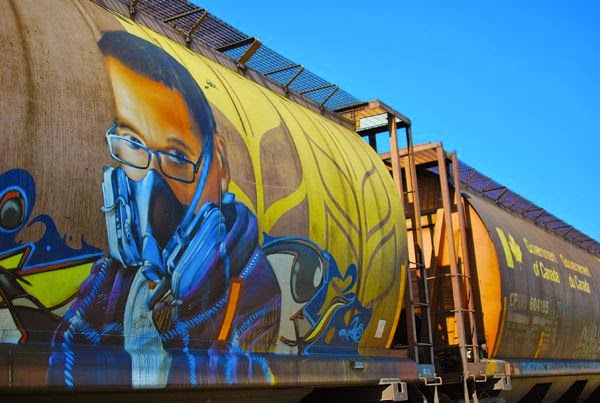 How many of you have been on a train? I love travelling on a train, or subway. We see trains all the time. They are not an uncommon sight around Bassano. Many of the staff will laugh about my obsession with trains, because it began while trying to sleep in camper trailer and being woken up several times each evening to the train whistle as it approached the highway crossroads. My father-in-law was a train man for 37 years, and he was telling me there is pattern to the whistles. - Two long, one short or two short, one long means the train is approaching a grade level crossing or road crossing. Multiple short whistles mean Danger! Something is on the track like livestock or a vehicle. In any case, for the first few weeks in Bassano, I heard every train that went through town; supposedly we have 23 that go through each day. I think there are more! People tell me I'll get use to it, and I have already to some extent, but I do like the sound of the train. It's become a familiar sound.
How many of you have been on a train? I love travelling on a train, or subway. We see trains all the time. They are not an uncommon sight around Bassano. Many of the staff will laugh about my obsession with trains, because it began while trying to sleep in camper trailer and being woken up several times each evening to the train whistle as it approached the highway crossroads. My father-in-law was a train man for 37 years, and he was telling me there is pattern to the whistles. - Two long, one short or two short, one long means the train is approaching a grade level crossing or road crossing. Multiple short whistles mean Danger! Something is on the track like livestock or a vehicle. In any case, for the first few weeks in Bassano, I heard every train that went through town; supposedly we have 23 that go through each day. I think there are more! People tell me I'll get use to it, and I have already to some extent, but I do like the sound of the train. It's become a familiar sound. 
Every morning that I'm out running at 6:30 AM, I see trains going through town. I love watching them go by. Each car uniquely spray painted by some artist somewhere in Canada or the USA. It makes you wonder where that car has been. And the detail is amazing as illustrated in the picture here.
How many of you knew that trains were responsible for us living in Mountain Standard Time? Time zones have not always been around. In fact, Sir Sandford Fleming, a Canadian railway planner and engineer, outlined a plan for worldwide standard time in the late 1870s. On November 18, 1883, the railway implemented Standard Time Zones for all railways in the USA and Canada. Then the Government of Canada passed legislation implementing time zones across Canada on July 1, 1891.
All this train talk got me thinking about the word, train. Where does it come from? So I did a little research and learned that the word train used as a noun, comes from the Latin meaning to pull, or draw. On a long dress, a train is the long part of material that is being pulled behind. As a verb, train means to educate, instruct, or teach. Training is not confined to just teachers and schools though; training begins at home first. In fact, parents are the first teachers. Following the wise old proverb we as parents are called to, "Train up a child in the way he should go, and when he is old he will not depart from it." Train, or Pull, or Draw the learning from the each learner in this lifelong process, that's what we do as parents, and that's what we do as teachers.
We are tasked by Alberta Education to educate our students. We are to train them with the skills that will help them succeed later on in life after school. So this year, we have a Ministerial Order that has commissioned us to ensure that we train our children the following 10 skills or competencies across all subject areas. These competencies are sets of attitudes, skills and knowledge that are drawn upon and applied to different situations and subject areas for successful learning and living. They will be developed by every student, in every grade and across every subject/discipline area. They are:
- Know how to learn...
- Think critically...
- Identify and solve complex problems...
- Manage information...
- Innovate...
- Create opportunities...
- Apply multiple literacies...
- Demonstrate good communication skills and the ability to work cooperatively with others
- Demonstrate global and cultural understanding..
- Identify and apply career and life skills...

If you want more information about these, check out the link at Cross-Curricular Competencies.
We talk a lot about learning these days, and being a lifelong learner, which is very student-centred. But in order, for our students to be successful in learning, we need to train them how to learn, think critically, work through problems, manage the information, and more. We will pull and draw this out of our students, because we believe that can and will exceed their potential this year and in the years to come. So every time you see a train this year, think about learning, whether it is your learning or our students learning. It's a year to train.
No comments:
Post a Comment